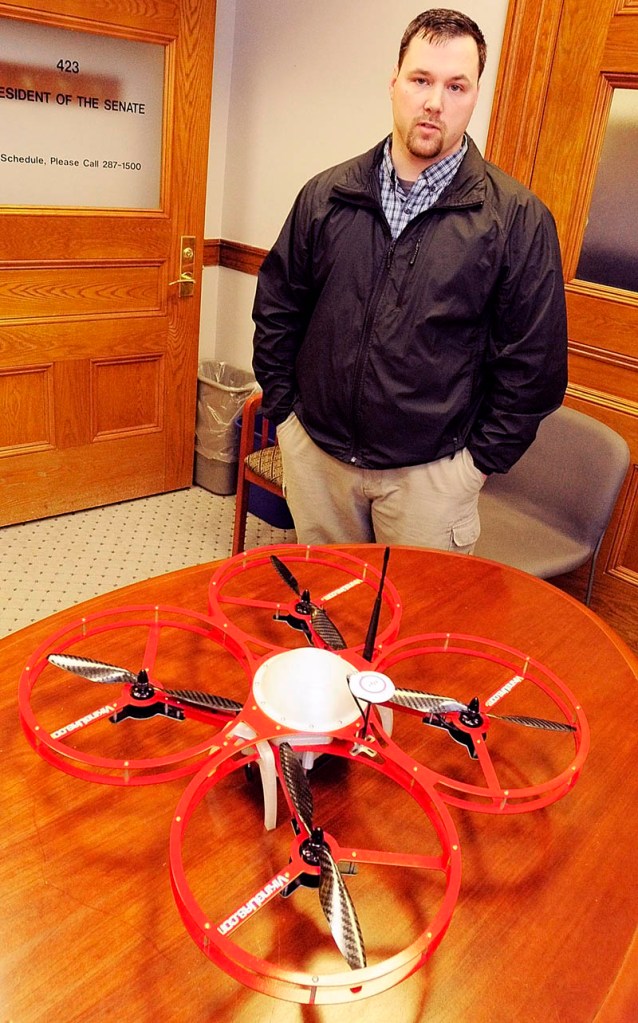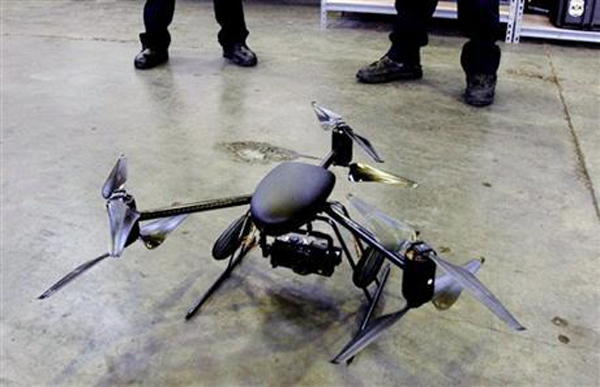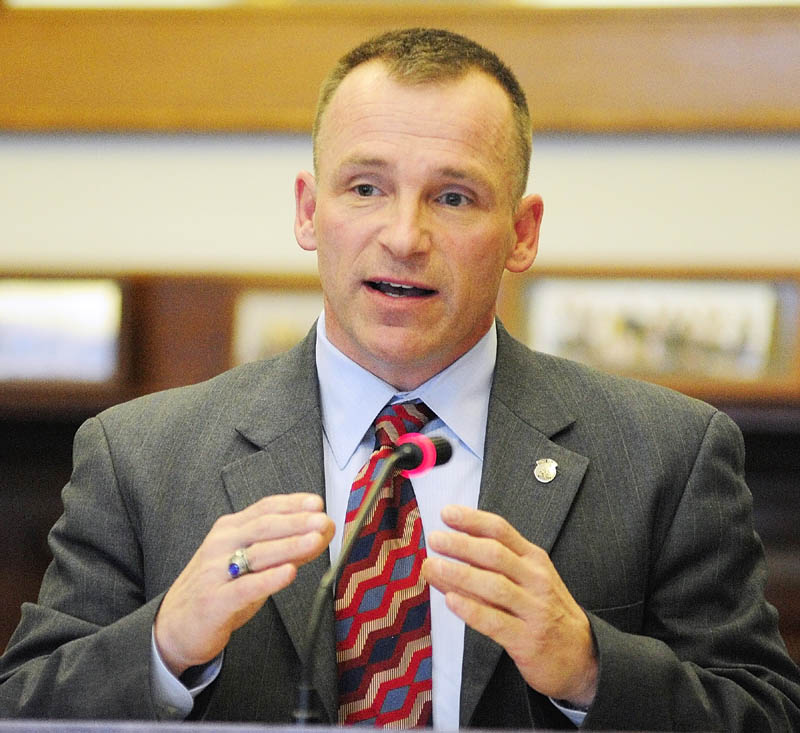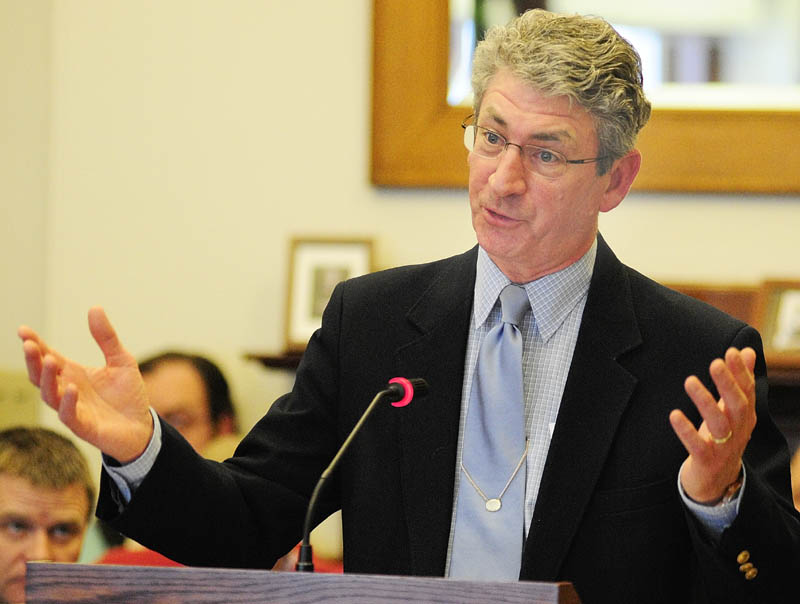AUGUSTA — Maine police have yet to launch a drone to gather information from the sky, but the prospect of law enforcement surveillance overhead was enough to prompt a legislative hearing Tuesday on a bill that would regulate drone use.
The proposal by state Sen. John Patrick, D-Rumford, would limit the ability of law enforcement to use drones and require a warrant in most cases, according to the American Civil Liberties Union of Maine. The chapter’s parent organization is leading a campaign in many states to strike pre-emptively at the aircraft before they become established as law enforcement tools.
Maine is one of 21 states currently considering legislation to regulate the use of drones, according to the national ACLU. Stateline reported earlier this month that nine law enforcement agencies in six states – Alabama, Arkansas, Colorado, Florida, Texas and Washington – have been authorized to use drones, while nine more have applied to the FAA to do so.
The Maine Department of Public Safety bought a drone recently for about $300, but the agency’s deputy chief said it was just for the sake of “curiosity.”
“We definitely would not want to deploy anything without a clear policy direction,” said Lt. Col. Raymond Bessette, the department’s deputy chief. He said the department will use it in training until it figures out how the unmanned aircraft can help them.
A range of groups testified in favor of the bill Tuesday, including those from the libertarian Defense of Liberty political action committee, a medical marijuana trade group and an anti-war veterans’ group.
“Big Brother is no longer the stuff of science fiction,” Patrick said in his testimony. “The technology is real, it is in America and it will inevitably come to Maine, yet our laws have not kept up with this advancing technology.”
The bill defines a drone as “an aircraft that is operated without a physical human presence within or on the aircraft and guided by remote control.” The aircraft does not have to be equipped with a camera to be considered a drone, however, it cannot have a weapon attached to it.
Several who testified said the measure needs work.
Attorney General Janet Mills said in written testimony that she supports the bill’s aim, but the language is too broad and could be read to prohibit children from flying toy airplanes. The bill could also prevent the use of drones for news gathering, mapping, weather monitoring or private investigations.
“I would like to support this bill, because I know its intentions are good,” Mills wrote. “But I cannot.”
Assistant Attorney General William Stokes, speaking for Mills at the hearing, suggested the committee take a year to review drones before acting on legislation. Mills recommended that the Maine Criminal Justice Academy’s board of trustees be charged with developing a protocol.
Bessette, the public safety department officer, testified against the bill, saying he agrees with Mills’ suggestion.
Daniel Bernier, an attorney for the Maine Society of Land Surveyors, echoed concerns about the restrictions in the bill.
He said the potential for drone use in surveying at least requires an exemption, as land photography can be done cheaply and precisely with a drone.
“I often kid that I almost never testify on behalf of the land surveyors because I can’t get them to get mad about anything,” he said. “They’re not mad, but there is a panic setting in if engaged in a major mapping project without aerial photography.”
Federal rules allow for everyone to fly drones below an altitude of 400 feet. Shenna Bellows, the ACLU of Maine executive director, said the potential for drones to become ubiquitous in law enforcement compels the state to develop limits.
“Without the kinds of limits proposed by (the bill), even law-abiding people will be chilled in their movements,” she said. “Unfortunately, cheap technology and a change in the federal rules make the specter of backyard surveillance a real and terrifying possibility.”
While citizens can legally use drones, the aircraft are best known for their lethal use in overseas military operations.
President Obama has been criticized for his use of a “kill list” — a list of high-profile terrorist targets the president holds final judgment on before attacking, The New York Times has reported.
The Associated Press recently reported that a recently surfaced Justice Department memo “shows drones can strike against a wider range of threats, with less evidence, than previously believed.”
A 2011 strike in Yemen killed Anwar al-Awlaki, an American citizen who joined al-Qaida, setting off a moral debate about drones’ use on citizens abroad. Many in Congress, including U.S. Sen. Angus King, I-Maine, have advocated for a court that would review strikes before they happen.
“Having the executive being the prosecutor, the judge, the jury and the executioner all in one is very contrary to the traditions and the laws of this country,” King said at a Feb. 7 congressional hearing.
Last year, Congress directed the Federal Aviation Administration to allow military, commercial and privately owned drones in currently commercial airspace by 2015. The FAA has said that within five years of that date, there could be 10,000 domestic drones in use in America. By 2030, there could be 30,000.
An interactive map from the Electronic Freedom Foundation, which obtained a list of entities that have been authorized to use drones, shows the closest licensed drone to Maine is used by the University of Connecticut for research. It’s a 6-foot, remote-controlled helicopter, according to Hartford Courant.
But that doesn’t mean there are no drones in Maine airspace.
One Portland company advertises on its website that it offers aerial photography using drones, suggesting that the technology can be an effective tool for marketing real estate or capturing aerial images for other commercial purposes.
Michael Shepherd can be contacted at 620-7015 or at:
mshepherd@mainetoday.com
Copy the Story LinkSend questions/comments to the editors.








Success. Please wait for the page to reload. If the page does not reload within 5 seconds, please refresh the page.
Enter your email and password to access comments.
Hi, to comment on stories you must . This profile is in addition to your subscription and website login.
Already have a commenting profile? .
Invalid username/password.
Please check your email to confirm and complete your registration.
Only subscribers are eligible to post comments. Please subscribe or login first for digital access. Here’s why.
Use the form below to reset your password. When you've submitted your account email, we will send an email with a reset code.